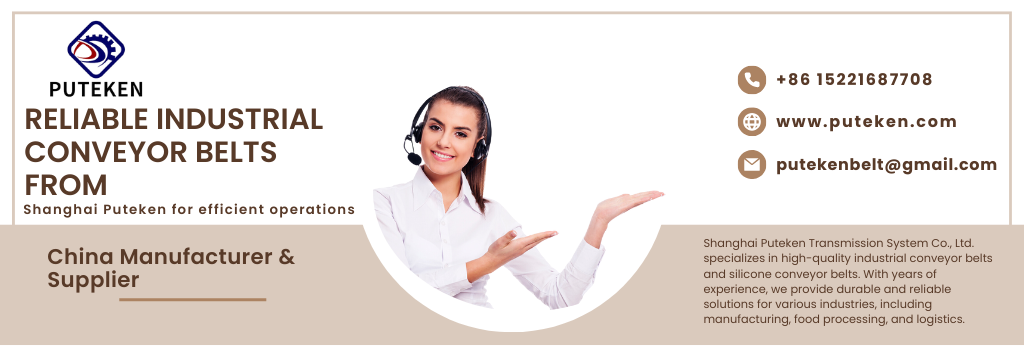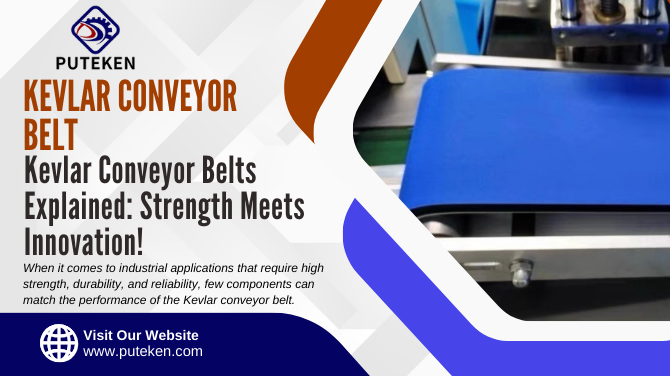When it comes to industrial applications that require high strength, durability, and reliability, few components can match the performance of the Kevlar conveyor belt. Over the years, this powerful belt has revolutionized material handling in various industries, from mining and automotive manufacturing to food processing and logistics. With its exceptional resistance to wear and tear, high tensile strength, and lightweight design, the Kevlar conveyor belt stands as a perfect example of how innovation can meet the demanding needs of modern industry.
At Shanghai Puteken Transmission System Co., Ltd., we understand the importance of using high-performance components to optimize your operations. That's why we take pride in offering top-quality Kevlar conveyor belts that provide the strength and durability needed to withstand the toughest environments. Whether you're working with heavy materials, high-speed applications, or challenging operating conditions, the Kevlar conveyor belt ensures that your machinery continues to perform at its best.
What is a Kevlar Conveyor Belt?
A Kevlar conveyor belt is a type of belt made with high-strength Kevlar fibers, a synthetic material known for its extraordinary durability and resistance to heat, abrasion, and chemicals. Originally developed by DuPont, Kevlar is most commonly associated with bulletproof vests, but its unique properties have found applications across various industries, including those in the material handling and transportation sectors.
Kevlar fibers are woven into the fabric of the conveyor belt to form a strong yet lightweight material that can handle extreme stress and tension. Unlike traditional steel-reinforced belts, Kevlar conveyor belts offer superior strength-to-weight ratios, which makes them ideal for long-distance and high-speed applications. Additionally, Kevlar’s excellent resistance to temperature variations, chemicals, and environmental factors ensures that these belts last longer and require less maintenance, making them a more cost-effective solution in the long run.
The Benefits of Kevlar Conveyor Belts
As industries continue to push the boundaries of performance, there’s an increasing need for equipment that can deliver under the harshest conditions. Kevlar conveyor belts are at the forefront of this technological advancement, offering a wide range of benefits that set them apart from traditional belts. Let’s explore the key advantages of these powerful belts:
- Exceptional Strength and Durability
One of the standout features of Kevlar conveyor belts is their extraordinary strength. Kevlar fibers are five times stronger than steel on an equal weight basis, making them ideal for handling heavy loads and carrying materials over long distances. This strength ensures that the belts can withstand high tension and pressure, reducing the risk of belt failure or breakage. Whether you’re moving heavy metals, coal, or other tough materials, Kevlar conveyor belts can handle the job without compromising performance.
- Lightweight and Flexible
Despite their remarkable strength, Kevlar conveyor belts are surprisingly lightweight. This is a major advantage when dealing with high-speed operations, as the reduced weight of the belt allows for faster and more efficient movement. The flexibility of Kevlar also makes it easier to handle, install, and maintain compared to traditional steel-reinforced belts. Additionally, the lightweight nature of Kevlar belts means they put less strain on the machinery, reducing energy consumption and extending the life of the conveyor system.
- Superior Resistance to Abrasion and Wear
In industries where heavy-duty use is the norm, wear and tear can quickly degrade the performance of traditional conveyor belts. Kevlar conveyor belts, however, are highly resistant to abrasion, which means they last longer and require fewer replacements. This durability makes them perfect for applications that involve rough materials or high-impact environments, where traditional belts would fail under the strain.
- High Temperature and Chemical Resistance
Another key benefit of Kevlar conveyor belts is their resistance to extreme temperatures and harsh chemicals. Kevlar’s ability to withstand high temperatures makes it suitable for industries like cement production, steel manufacturing, and food processing, where heat resistance is essential. Furthermore, Kevlar belts are resistant to a wide range of chemicals, making them ideal for environments where exposure to oils, acids, or other corrosive substances is common.
- Low Maintenance and Cost-Effective
Due to their exceptional durability and resistance to wear, Kevlar conveyor belts require less maintenance compared to traditional belts. This results in fewer downtime events, reducing the cost of repairs and maintenance. Over time, the reduced need for replacements and maintenance can significantly lower the overall cost of ownership, making Kevlar conveyor belts a cost-effective solution for businesses looking to improve efficiency and reduce operational expenses.
- Improved Safety and Reliability
Safety is a top priority in any industrial environment, and Kevlar conveyor belts help improve workplace safety by reducing the likelihood of belt failure. The belts’ superior tensile strength and resistance to extreme conditions ensure that they can handle the toughest applications without risk of snapping or breaking, reducing the chance of accidents and injuries. With a more reliable and durable conveyor system in place, businesses can operate more smoothly and confidently.
Applications of Kevlar Conveyor Belts
The versatility of Kevlar conveyor belts allows them to be used in a wide range of industries and applications. Whether it’s in material handling, packaging, or mining, these belts provide the reliability and performance needed to keep operations running smoothly. Here are just a few of the industries where Kevlar conveyor belts are making an impact:
- Mining and Quarrying
Kevlar conveyor belts are commonly used in mining and quarrying operations to transport heavy materials such as coal, sand, gravel, and minerals. The strength and durability of Kevlar make it well-suited for these demanding environments, where belts are subjected to harsh conditions like abrasion, heavy loads, and extreme weather.
- Utomotive Manufacturing
In the automotive industry, precision and efficiency are key. Kevlar conveyor belts help maintain smooth and continuous material flow in automotive assembly lines, ensuring that parts and components are transported without disruption. The belts’ lightweight design allows for higher-speed operations, contributing to faster production times and improved throughput.
- Food Processing
The food processing industry requires equipment that meets strict hygiene and safety standards. Kevlar conveyor belts are ideal for transporting food products, as they are easy to clean, resistant to heat and chemicals, and can handle heavy loads without fail. Whether it's in packaging, sorting, or material handling, Kevlar belts help ensure that food products are processed efficiently and safely.
- Packaging and Logistics
In packaging and logistics, the need for speed and reliability is crucial. Kevlar conveyor belts help facilitate the quick and efficient movement of goods, reducing delays and improving productivity. Their ability to withstand heavy loads and high speeds makes them a preferred choice in warehouses, distribution centers, and logistics hubs.
- Cement and Steel Production
Both cement and steel production require conveyor systems that can withstand extreme temperatures and abrasive materials. Kevlar conveyor belts are the perfect solution for these industries, as they offer the necessary heat and abrasion resistance to handle materials such as cement powder, molten metal, and slag.
As industries continue to evolve, the need for more efficient, durable, and reliable components becomes ever more critical. The Kevlar conveyor belt represents a perfect blend of strength, innovation, and performance, making it an essential component for businesses looking to optimize their operations. With their ability to handle heavy loads, withstand extreme temperatures, and resist wear, Kevlar conveyor belts are changing the way materials are transported across various industries.
At Shanghai Puteken Transmission System Co., Ltd., we are proud to offer high-quality Kevlar conveyor belts that meet the highest industry standards. Whether you're involved in mining, manufacturing, or food processing, our Kevlar conveyor belts provide the reliability and performance you need to keep your operations running smoothly. Contact us today to learn more about how our Kevlar belts can revolutionize your material handling systems.

FAQs
- What makes Kevlar conveyor belts different from traditional belts?
Kevlar conveyor belts are made from high-strength Kevlar fibers, offering superior strength-to-weight ratios, resistance to abrasion, and enhanced durability compared to traditional belts made from steel or rubber.
- What industries use Kevlar conveyor belts?
Kevlar conveyor belts are commonly used in industries such as mining, automotive manufacturing, food processing, packaging, logistics, and cement production.
- How long do Kevlar conveyor belts last?
Kevlar conveyor belts are designed to last longer than traditional belts due to their exceptional durability, abrasion resistance, and ability to withstand harsh environments.
- Are Kevlar conveyor belts more expensive than regular belts?
While Kevlar conveyor belts may have a higher initial cost, their longer lifespan and reduced maintenance costs make them a cost-effective solution in the long run.
- Can Kevlar conveyor belts handle high temperatures?
Yes, Kevlar conveyor belts are highly resistant to heat, making them suitable for applications that involve high temperatures, such as cement and steel production.



